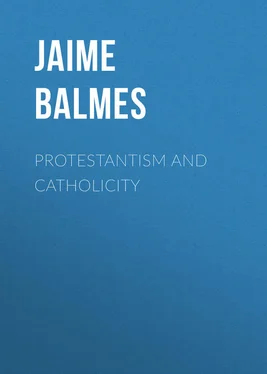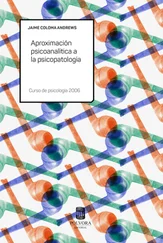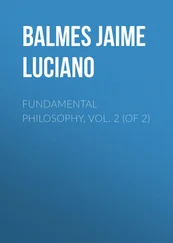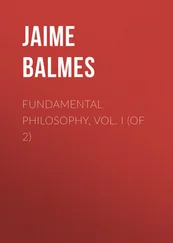Jaime Balmes - Protestantism and Catholicity
Здесь есть возможность читать онлайн «Jaime Balmes - Protestantism and Catholicity» — ознакомительный отрывок электронной книги совершенно бесплатно, а после прочтения отрывка купить полную версию. В некоторых случаях можно слушать аудио, скачать через торрент в формате fb2 и присутствует краткое содержание. Жанр: foreign_antique, foreign_prose, на английском языке. Описание произведения, (предисловие) а так же отзывы посетителей доступны на портале библиотеки ЛибКат.
- Название:Protestantism and Catholicity
- Автор:
- Жанр:
- Год:неизвестен
- ISBN:нет данных
- Рейтинг книги:3 / 5. Голосов: 1
-
Избранное:Добавить в избранное
- Отзывы:
-
Ваша оценка:
- 60
- 1
- 2
- 3
- 4
- 5
Protestantism and Catholicity: краткое содержание, описание и аннотация
Предлагаем к чтению аннотацию, описание, краткое содержание или предисловие (зависит от того, что написал сам автор книги «Protestantism and Catholicity»). Если вы не нашли необходимую информацию о книге — напишите в комментариях, мы постараемся отыскать её.
Protestantism and Catholicity — читать онлайн ознакомительный отрывок
Ниже представлен текст книги, разбитый по страницам. Система сохранения места последней прочитанной страницы, позволяет с удобством читать онлайн бесплатно книгу «Protestantism and Catholicity», без необходимости каждый раз заново искать на чём Вы остановились. Поставьте закладку, и сможете в любой момент перейти на страницу, на которой закончили чтение.
Интервал:
Закладка:
But it is in vain for man to struggle against the nature of things: Protestantism endeavored, without success, to limit the right of private judgment. It raised its voice against it, and sometimes appeared to attempt its total destruction; but the right of private judgment, which was in its own bosom, remained there, developed itself, and acted there in spite of it. There was no middle course for Protestantism to adopt: it was compelled either to throw itself into the arms of authority, and thus acknowledge itself in the wrong, or else allow the dissolving principle to exert so much influence on its various sects, as to destroy even the shadow of the religion of Jesus Christ, and debase Christianity to the rank of a school of philosophy.
The cry of resistance to the authority of the Church once raised, the fatal results might be easily imagined; it was thus easy to foresee that that poisoned germ, in its development, must cause the ruin of all the Christian truths; and what could prevent its rapid development in a soil where fermentation was so active? Catholics were not wanting to proclaim loudly the greatness and imminence of the danger; and it must be allowed that many Protestants foresaw it clearly. No one is ignorant that the most distinguished men of the sect gave their opinions on this point, even from the beginning. Men of the greatest talent never found themselves at ease in Protestantism. They always felt that there was an immense void in it; this is the reason why they have constantly inclined either towards irreligion or towards Catholic unity.
Time, the best judge of opinions, has confirmed these melancholy prognostics. Things have now reached such a pass, that those only who are very ill instructed, or who have a very limited grasp of mind, can fail to see that the Christian religion, as explained by Protestants, is nothing more than an opinion – a system made up of a thousand incoherent parts, and which is degraded to the level of the schools of philosophy. If Christianity still seems to surpass these schools in some respects, and preserves some features which cannot be found in what is the pure invention of the mind of man, it ought not to be a matter of astonishment. It is owing to that sublimity of doctrine and that sanctity of morality which, more or less disfigured, always shines while a trace is preserved of the words of Jesus Christ. But the feeble light which struggles with darkness after the sun has sunk below the horizon, cannot be compared to that of day: darkness advances and spreads; it extinguishes the expiring reflection, and night comes on. Such is the doctrine of Christianity among Protestants. A glance at these sects shows us that they are not purely philosophical, but it shows us at the same time that they have not the characters of true religion. Christianity has no authority therein; and is there like a being out of its proper element, – a tree deprived of its roots: its face is pale and disfigured like that of a corpse. Protestantism talks of faith, and its fundamental principle destroys it; it endeavors to exalt the gospel, and its own principle, by subjecting that gospel to private judgment, weakens its authority. If it speak of the sanctity and purity of Christian morality, it is reminded that some of its dissenting sects deny the divinity of Jesus Christ; and that they all may do so according to the principle on which it rests. The Divinity of Jesus Christ once doubted, the God-made man is reduced to the rank of a great philosopher and legislator; He has no longer the authority necessary to give to His laws the august sanction which renders them so holy in the eyes of men; He can no longer imprint upon them the seal which raises them above all human thoughts, and His sublime instructions cease to be lessons flowing from the lips of uncreated Wisdom.
If you deprive the human mind of the support of authority of some kind or other, on what can it depend? Abandoned to its own delirious dreams, it is forced again into the gloomy paths which led the philosophers of the ancient schools to chaos. Reason and experience are here agreed. If you substitute the private judgment of Protestants for the authority of the Church, all the great questions respecting God and man remain without solution. All the difficulties are left; the mind is in darkness, and seeks in vain for a light to guide it in safety: stunned by the voices of a hundred schools, who dispute without being able to throw any light on the subject, it relapses into that state of discouragement and prostration in which Christianity found it, and from which, with so much exertion, she had withdrawn it. Doubt, pyrrhonism, and indifference become the lot of the greatest minds; vain theories, hypothetical systems, and dreams take possession of men of more moderate abilities; the ignorant are reduced to superstitions and absurdities.
Of what use, then, would Christianity have been on the earth, and what would have been the progress of humanity? Happily for the human race, the Christian religion was not abandoned to the whirlwind of Protestant sects. In Catholic authority she has found ample means of resisting the attacks of sophistry and error. What would have become of her without it? Would the sublimity of her doctrines, the wisdom of her precepts, the unction of her counsels, have been now any thing more than a beautiful dream, related in enchanting language by a great philosopher? Yes, I must repeat, without the authority of the Church there is no security for faith; the divinity of Jesus Christ becomes a matter of doubt; His mission is disputed; in fact, the Christian religion disappears. If she cannot show us her heavenly titles, give us full certainty that she has come from the bosom of the Eternal, that her words are those of God Himself, and that He has condescended to appear on earth for the salvation of men, she has then lost her right to demand our veneration. Reduced to the level of human ideas, she must, then, submit to our judgment like other mere opinions; at the tribunal of philosophy she may endeavor to maintain her doctrines as more or less reasonable; but she will always be liable to the reproach of having wished to deceive us, by passing herself off as divine when she was only human; and in all discussions on the truth of her doctrines, she will have this fatal presumption against her, viz. that the account of her origin was an imposture.
Protestants boast of their independence of mind, and reproach the Catholic religion with violating the most sacred rights, by demanding a submission which outrages the dignity of man. Here extravagant declamation about the strength of our understanding is introduced with good effect; and a few seductive images and expressions, such as " bold flights " and " glittering wings ," &c., are enough to delude many readers.
Let the human mind enjoy all its rights; let it boast of possessing that spark of divinity called the intellect; let it pass over all nature in triumph, observing all the beings by which it is surrounded, and congratulate itself on its own immense superiority, in the midst of the wonders with which it has known how to embellish its abode; let it point out, as proofs of its strength and grandeur, the changes which are everywhere worked by its presence; by its intellectual force and boldness it has acquired the complete mastery over nature. Let us acknowledge the dignity and elevation of our minds to show our gratitude to our Creator, but let us not forget our weakness and defects. Why should we deceive ourselves by fancying that we know what we are really ignorant of? Why forget the inconstancy and variableness of our minds, and conceal the fact, that with respect to many things, even of those with which we are supposed to be acquainted, we have but confused ideas? How delusive is our knowledge, and what exaggerated notions we have of our progress in information? Does not one day contradict what another had affirmed? Time runs its course, laughs at our predictions, destroys our plans, and clearly shows how vain are our projects.
Читать дальшеИнтервал:
Закладка:
Похожие книги на «Protestantism and Catholicity»
Представляем Вашему вниманию похожие книги на «Protestantism and Catholicity» списком для выбора. Мы отобрали схожую по названию и смыслу литературу в надежде предоставить читателям больше вариантов отыскать новые, интересные, ещё непрочитанные произведения.
Обсуждение, отзывы о книге «Protestantism and Catholicity» и просто собственные мнения читателей. Оставьте ваши комментарии, напишите, что Вы думаете о произведении, его смысле или главных героях. Укажите что конкретно понравилось, а что нет, и почему Вы так считаете.












